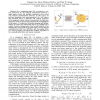Free Online Productivity Tools
i2Speak
i2Symbol
i2OCR
iTex2Img
iWeb2Print
iWeb2Shot
i2Type
iPdf2Split
iPdf2Merge
i2Bopomofo
i2Arabic
i2Style
i2Image
i2PDF
iLatex2Rtf
Sci2ools
90
Voted
ICRA
2005
IEEE
2005
IEEE
Bilateral Teleoperation of Multiple Cooperative Robots over Delayed Communication Networks: Application
Abstract— In a companion paper [1], we propose a control framework for the bilateral teleoperation between a single master robot and multiple cooperative slave robots over delayed communication network. In this paper, we perform simulation and semi-experiment (i.e. real master and simulated slaves) to illustrate and validate properties of the proposed control scheme. In particular, the three key properties of the proposed control framework are highlighted in this paper: 1) cooperative fixtureless grasping and manipulation of inertial and deformable objects by multiple slave robots; 2) passive teleoperation of the overall behavior of the multiple slave robots (and the grasped object) over the delayed communication with force reflection; and 3) grasping safety (i.e. secure grasping) and interaction stability regardless of the communication delay and human command.
Related Content
| Added | 25 Jun 2010 |
| Updated | 25 Jun 2010 |
| Type | Conference |
| Year | 2005 |
| Where | ICRA |
| Authors | Dongjun Lee, Oscar Martinez-Palafox, Mark W. Spong |
Comments (0)

